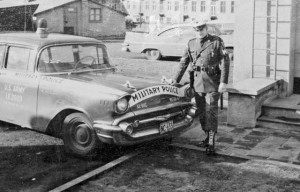
Finally reaching the end of his career, the exhausted medical officer cleared his office, starting with the photos he collected throughout the years. Each picture frame was carefully lifted off the once decorated wall. He held each frame firmly in his aging hand and ran a finger along its smooth edges, not to wipe the accumulation of dry, insignificant dust that had collected over the years, but to recall a 54-year journey that has engrained itself within the relic.
The memories were of a young childhood filled with hope and death for the sake of becoming a football star, which, oblivious to John Mace all those years ago, would only be the start to a much greater future.
“I have always loved sports,” said Mace, who worked as a special operations medical officer for the 86th Medical Group. “Even as a young boy I knew football was my passion, and I was willing to do anything to be a pro-star.”
Growing up in a small town outside of Morganton, North Carolina, the young Mace did what he could to learn and play football better, even with the limited teams available in his area.

John Mace stands next to a military police vehicle during his time in the Army.
“I joined an industrial league, a church league and really anything else I could get my hands on,” Mace said. “But due to money, the biggest team I could join at the time was maxed at six kids, and no one received any great scholarships to any big colleges through that. So, I knew if I wanted to get anywhere with this dream of mine I would need to gain a residence within the city limits where the resources and skills were available.”
Leaving everything he knew behind, the young eighth-grader went off to the city in search of some way to continue his passion.
“I already found the high school I wanted to attend and met with the coach to see if he would be willing to add me to the team,” Mace said. “Being as big then as I am now so many years later, and of course that much faster, he more than gladly accepted me.
“That was only the first step,” he continued. “I then needed to find a place to mark as my residence, and that’s when I remembered there was a funeral home across the street that had buried my uncle. So I went there to see if the owner would be willing to help.”
After speaking with the owner and explaining his situation, Mace soon had a new place to stay and a job, making $5 a week.
A few years later, Mace quickly rose through the ranks on the field, and his passion to be a pro seemed to be only a field goal away.
“Everything was going so well I almost couldn’t believe it,” he said as a touch of sadness crept into a once energetic voice. “I was on the varsity team, had two scholarships, and in one night it was all taken from me; my passion, the scholarships, the life I worked so hard for — gone.”
In his senior year, Mace tore the ligaments between one of his knees and was hospitalized for 10 days, restricted to the confines of a bed.
“There was no microscopic surgery back in my day, so they would have had to pop my knee open and perform the repairs, which provided a 50/50 chance of some improvement, or I would walk with a limp the rest of my life,” the medical officer said. “Even though I knew everything I had strived for was gone, I still didn’t want to live with a limp, so I said no.”
During his stay in the hospital, he received visitors from the colleges he had scholarships for. Though their visit was to close the doors on a future Mace wanted, they did open up a door to something much more. They suggested he play football with the Army.
After recovering, Mace ambitiously joined the Army as a medic where he would be able to put some of the anatomy skills he learned at the funeral home to good use.
“I finished training and arrived on station at a large hospital in Frankfurt, Germany,” he said. “The place was huge: 600 beds, doctors everywhere. They even had their own military police.”
Assigned to the ward, the young medical technician felt as though he could be contributing more, so he submitted a request to join the military police in Washington, D.C.
“It only took about 30 days before I got a call from the military personnel office saying they had my orders, and man did I run down,” Mace said. “I couldn’t have been more excited, but it was surprising how that excitement vanished almost instantly once he read where I was going.”
Mace would soon be going to the U.S. Disciplinary Barracks in Fort Leavenworth, Kansas, the U.S. military’s only maximum-security facility as well as the home for inmates on their way to death row.
“I expressed how this wasn’t what I requested, and the guy behind the desk said, ‘Well, you did put in for a special assignment,’” Mace said. “Then I asked him, ‘Well, what makes me so special that the Army would want me there?’ The guy said it was because I was six feet tall and 200 pounds. That’s how I was special.”
The 200-pound giant went off to Kansas where he worked as a guard surrounded by 515 inmates daily. But he said one of the hardest parts during that time were the exhaustingly long hours.
“After a while, those hours mixed with the type of environment I worked on really took a toll on me,” Mace said. “I felt like the only difference between me and the inmates is at the end of the day I went home — they didn’t.
“I couldn’t do it anymore,” he continued. “I felt like I really needed to get my life together and stop going from job to job (within the disciplinary barracks). I heard about an open position for a guard in the laundry mat, and the best part was I would be working from 7 in the morning until 3 p.m. However, the inmates doing the laundry were the most dangerous in the barracks.”
Mace found out there was only an opening because the previous guard had been attacked, but the short hours were more than worth it to him, or so he thought at first.
“Something most people don’t think about is that you can’t hear someone screaming for help over the deafening noise coming off the industrial size dryers,” Mace said. “That’s something I learned rather quickly.
“One day I was walking past a dryer, doing my usual rounds, and the only reason I stopped was because I thought I saw a face,” he continued. “Sure enough someone was inside a dryer being tossed around and I couldn’t hear him hollering. Even after I rescued him he wouldn’t give up the names of who shoved him in the giant machine. The prisoners had their own code of justice, and the things I’ve seen … I had to separate.”
Mace separated from the Army and enjoyed the civilian life for three months before joining the U.S. Air Force.
“I went back to medical and was stationed in Germany again where I practiced executive health,” he said. “This was when I realized what my true passion was.”
While working in executive health, Mace would interact with high-ranking officials from all branches of the military, as well as rescued prisoners of war and foreign dignitaries.
“I was doing some real good,” Mace said. “All my life I thought my purpose was to play football, and I hated myself the day that dream was taken away, but looking back I see it wasn’t a curse but the start to a much happier life.”
When Mace finally retired after 25 years of total military service as a master sergeant, he faced the difficult choice of what to do with the rest of his life. Just six months after separating from the military, he decided to return to the Air Force where he spent another 29 years in civil service, creating a legacy seen in the lives preserved through routine examinations, aiding service members in need of immediate care, and creating trauma kits used to safeguard military leaders.
“It has been a very long and exciting life,” Mace said. “Through my 25 years in the uniform and 29 more as civil service, I am grateful for all the things I was able to experience. While this chapter in my life is closing, I hope to go off and continue to do what the military has shown me to be my passion — helping people.”
Many years led Mace to this point in his life — years filled with hope when he began his dream of becoming a football star, tribulation when that dream was forever taken away and satisfaction when he found his true calling through the Air Force.
After taking a pause to wash away the 54 years of nostalgia, he placed the picture frame that brought so many memories of excitement into a dull cardboard box, leaving a museum filled of adventure and accomplishment empty.


